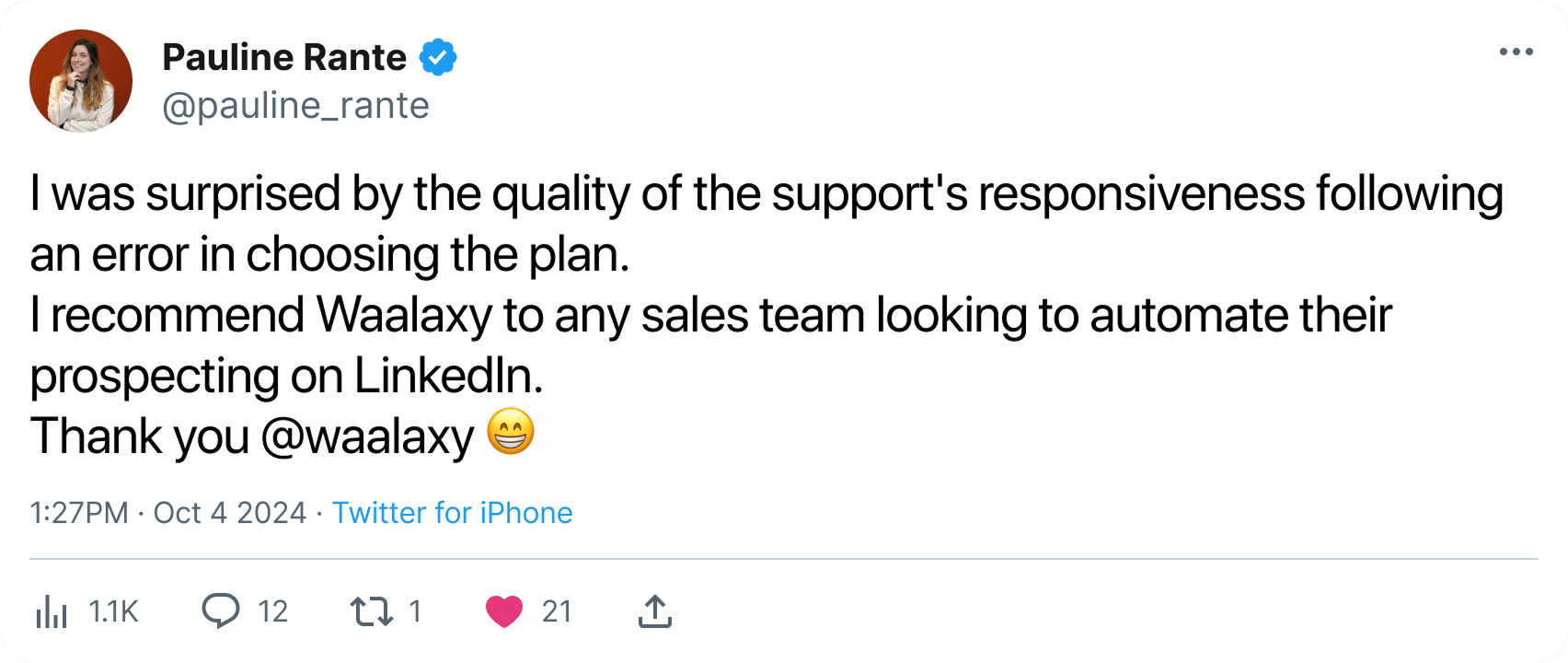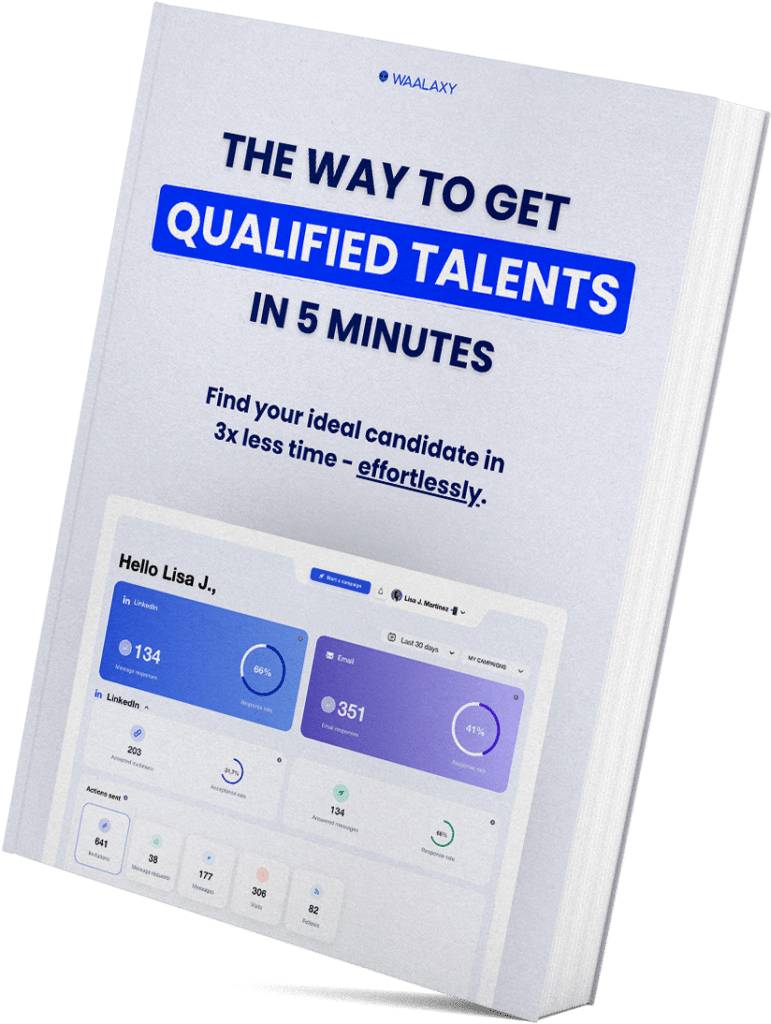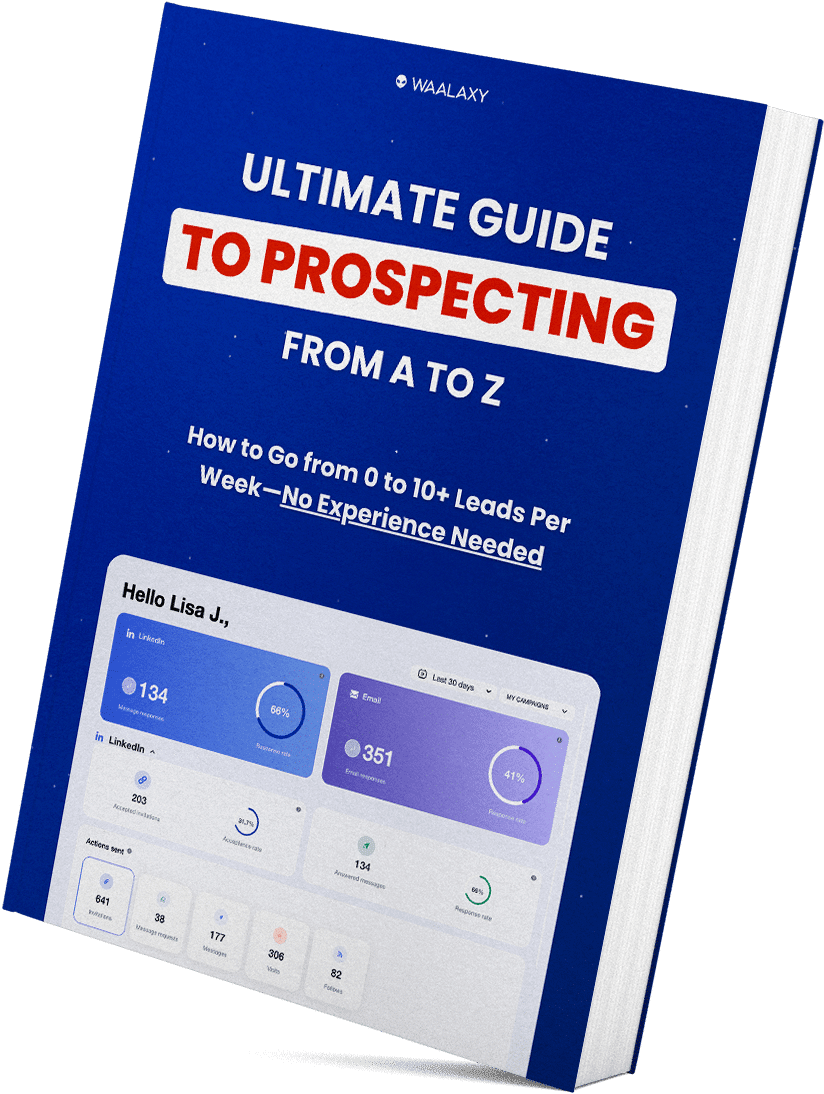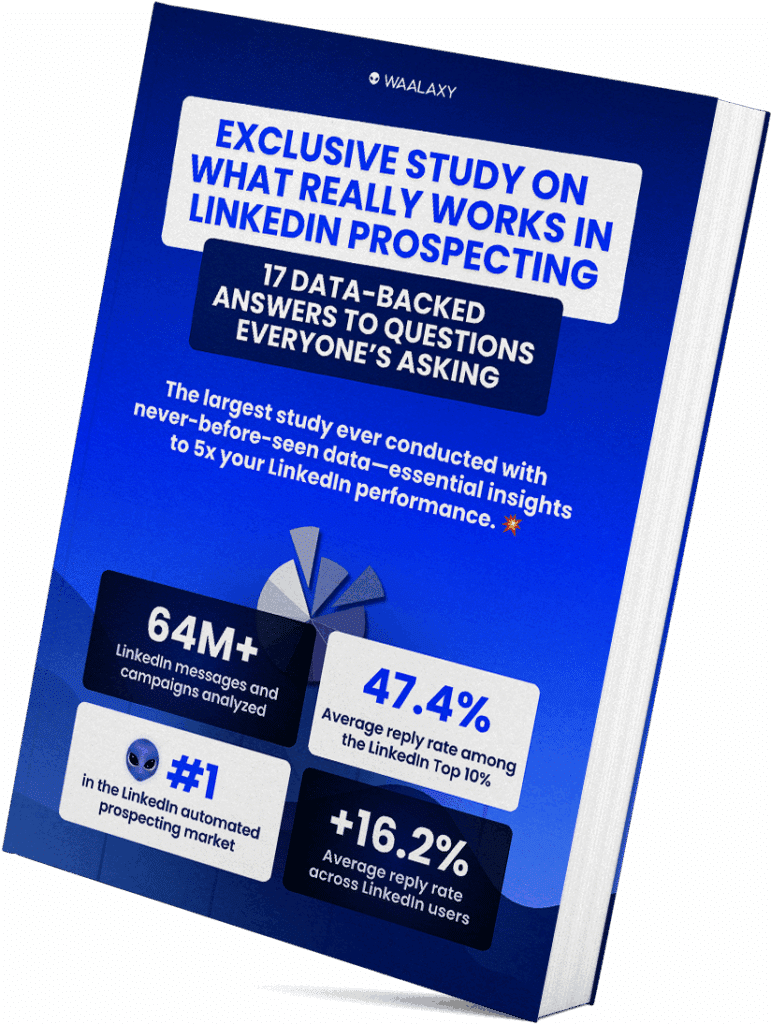Want to compare Google Bard vs ChatGPT? Want to be sure you’re choosing the right AI to generate content, save time and why not build a complete digital strategy? No matter how you use the tool, I’ve tested them for you in different forms 😉
Before I get started, I’ll give you a quick introduction to both tools.
What is ChatGPT?
ChatGPT is a language model developed by OpenAI a company specializing in artificial intelligence.🚀 It was launched in June 2020 and has undergone several updates since then. 📅 This model aims to generate text autonomously 🤖, allowing it to be used in a variety of contexts, from writing assistance to interaction conversational.
What’s Google Bard?
Google Bard is a chatbot developed by Google. I don’t need to explain what Google is, you’re on it.🌐 It appeared on the generative AI scene recently, making its debut in France in February 2023. The tool is designed to provide fast, accurate answers through an approach similar to ChatGPT. 🎉 Its main strength lies in its ability to access information.
Challenges and technologies of Google Bard vs ChatGPT
These two tools are at the cutting edge of innovation in terms of Generative AI. 💡 They aim to simplify and enhance various aspects of online communication, from writing content to answering complex questions.
Their usefulness is particularly striking in the fields of virtual assistance, content creation and user-machine interaction. They represent a milestone in the evolution of natural language technologies. Certainly, the most important of our era. 🚀
ChatGPT is based on the GPT (Generative Pre-trained Transformer 🧠) model from OpenAI, a software architecture for neural networks pre-trained on a vast amount of textual data. The tool has a great capacity to understand and generate text in multiple styles and contexts.
Google Bard, on the other hand, is powered by Google resources… Its functionalities are linked to online information access. 💻
Google Bard vs ChatGPT Summary
Here’s a rather technical summary of the two tools: ⏬
| Features | Bard (Google) | ChatGPT (OpenAI) |
| Language model | MDA | GPT |
| Real-time updates | Yes | No |
| Available languages | Currently, available in over 40 languages | Multilingual (over 100 languages) |
| Geographical access | Universal | Universal |
| Requires VPN | No | No |
| Access conditions | Google Account, 18 years and older | OpenAI’s account, universal access |
| History management | All recorded in “Bard Activity” and separated by conversation. | Registered on your Open IA account. Tabs separated by conversation. |
| Precise answers | Variables, makes fewer errors because it has up-to-date info, but is generally less accurate than ChatGPT. | Variables, may contain errors, especially because it lacks up-to-date information. |
| Google search capability | Yes, via the “Google it” button | No |
| Collecting data | Yes, to train AI | Yes, to train AI |
| Public availability | Public | Public |
Testing Google Bard vs ChatGPT tools
In order to succeed in this study, I decided to test several prompt and to ask the tools to answer my questions or to help me create content. I then analyze each result to explain the strengths of each tool. Shall we get started? 🔥
Test 1) Which AI makes the best summary tables?
We all know that AIs are very useful to create text summaries and help us gain maximum added value in minimum time. 🚀
My prompt was as short as possible, the objective was to see how the AI tool would get by with the minimum of information:
“Write me a cover letter and summarize the letter’s strong points in a table.”
Reply from ChatGPT
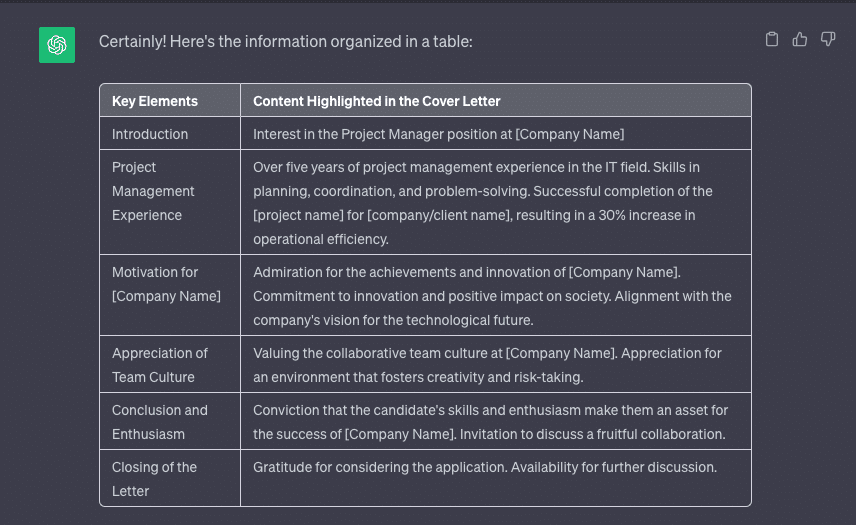
Reply from Google Bard
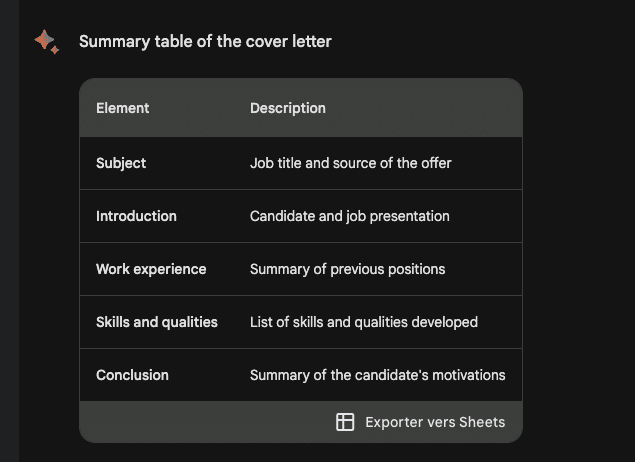
Test conclusion 1) “Tables” on the two AIs
There’s no photo there. (Well, there is, but you get my point.) ChatGPT provides a much more detailed response, the tool has really understood what “the strengths of the cover letter”, whereas Bard only gives me “the steps”, without getting too tired. 🥲
Test 2) Which AI writes the best content?
For this second test, I asked Bard and ChatGPT to write me content about artificial intelligence. 👀
The prompt:
“Write me unique, value-added content on the benefits of artificial intelligence. Present it as a chapter in an article.”
Reply from ChatGPT
Reply from Google Bard
Conclusion of Test 2) “Content” on both AIs
The word count is very similar, and both articles understand what’s at stake in my text, but they respond very differently. Where ChatGPT focuses on benefits in the use of AI, Bard doesn’t spread out too much on the subject and adds “examples of use” and “tips” to our chapter. 🌼 The content is of good quality for both tools.
However, I find ChatGPT gets more into the nitty-gritty of “benefits”, he doesn’t answer other questions I didn’t ask and expand on that part. As far as I’m concerned, he understood what I wanted, he gets a slight advantage again.🥇
Test 3) Which AI best answers my questions?
For this last test, I want to test the tools on how easy they are to answer me a simple question, adding a few elements of complexity. 🫡
Here’s the prompt:
“I’m writing a blog post aimed at supporting HR managers in integrating chatGPT/Bard into their recruitment processes.
Some of them might not be familiar with the tool, could you give me a brief definition of what a prompt is? Focus on the use of the ChatGPT/Bard prompt in the context of recruitment.”
Reply from ChatGPT

Reply from Google Bard
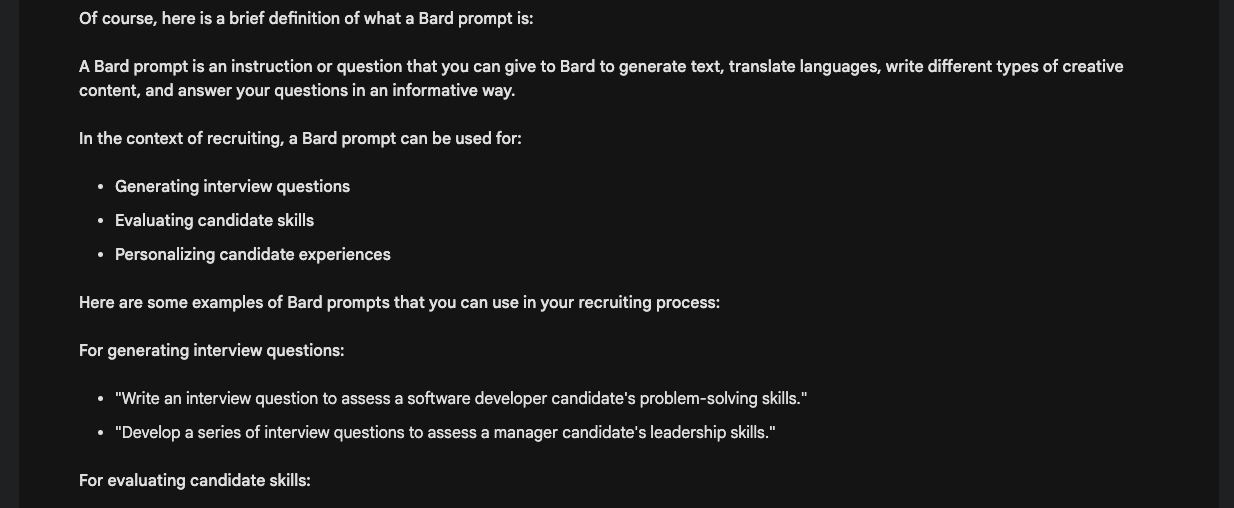
Test conclusion 3) “Question” on the two AIs
The answer is in two parts: definition and explanation.
In the case of definition, Google Bard was able to answer me with simpler words, perhaps better suited to the intended audience, but the two definitions were consistent. 🤩
For explanation, I give the medal to Bard. 🥇 The tool, in general (and we’ve seen more of it above), gives many more concrete examples on “how to use AI in the context of recruitment”. Reading Bard’s text, the structure seems more coherent and easy to read. On the other hand, if you want this type of structure on ChatGPT, simply add “share concrete examples with me” to your prompt.
In conclusion, Google Bard structured his text better and made it easier and quicker for me to understand the answer.
Summary of the benefits of Google Bard vs ChatGPT
Both Google Bard and ChatGPT stand at the forefront of generative AI, offering a wide spectrum of applications that cater to diverse industries and scenarios. Their adaptability and proficiency make them indispensable tools across numerous domains.
1. Customer Support and Assistance:
- ⭐️ Google Bard: Excels in providing real-time, accurate responses by accessing the latest information from the web. This is invaluable for swiftly addressing customer queries and concerns.
- ChatGPT: Offers instant and precise responses, making it a valuable asset in enhancing customer support experiences. Its extensive pre-trained knowledge enables it to handle a wide range of inquiries effectively.
2. Content Creation and Marketing:
- Google Bard: With its ability to fetch real-time data, it can generate content with the latest information, ensuring marketing materials are up-to-date and relevant.
- ⭐️ ChatGPT: Empowers content creators with the capability to generate high-quality articles, blog posts, and social media captions. Its adaptability across styles and contexts streamlines content production.
3. Programming and Development:
- Google Bard: Offers insights and solutions based on the most recent coding practices and technologies, making it a valuable resource for developers seeking guidance.
- ⭐️ ChatGPT: Provides code snippets and explanations in various programming languages, aiding developers in tasks ranging from debugging to conceptualizing solutions.
4. Multilingual Communication:
- ⭐️ Google Bard: Leverages its real-time access to the web to assist in translating content across a multitude of languages, facilitating global communication.
- ChatGPT: Exhibits multilingual capabilities, making it a versatile tool for businesses operating in diverse linguistic environments.
5. Education and E-Learning:
- ⭐️ Google Bard: Serves as an educational companion by offering explanations, answering queries, and providing additional resources in real time.
- ChatGPT: Enhances the learning experience by providing comprehensive explanations and supplemental learning materials, benefiting students and educators alike, but they must be careful about the accuracy of the information because ChatGPT doesn’t have updates from the internet.
6. Creative Writing and Storytelling:
- Google Bard: With its access to the latest trends and information, it can assist creative writers in crafting narratives grounded in contemporary knowledge.
- ⭐️ ChatGPT: Sparks creativity and aids in the development of imaginative content, making it an invaluable tool for authors, poets, and storytellers.
7. Research and Information Retrieval:
- ⭐️ Google Bard: Offers accurate and updated information, particularly beneficial for academics and researchers seeking to stay abreast of the latest developments.
- ChatGPT: Provides comprehensive knowledge based on its pre-trained data, aiding in research endeavors across a wide range of topics.
8. Social Media Management:
- Google Bard: Assists in creating engaging social media content by leveraging its real-time data retrieval capabilities.
- ⭐️ ChatGPT: Aids in maintaining a consistent brand voice across social media platforms, generating content that resonates with the target audience.
Here’s a quick summary of the information from the two tools after running the test: 👇
| Criteria | Google Bard | ChatGPT |
| Response speed | Faster response. | May take longer due to high freemium traffic. |
| Factual | Can draw information from the Web, with up-to-date access. | Known data ends in 2021 (or January 2022 for ChatGPT 4), cannot search online natively. |
| Training | Google Bard is more recent, so the tool has had less time (and users) to “nurture” itself, and is therefore slightly behind the times. | ChatGPT can understand a huge number of requests, no matter how complex or poorly formulated because the tool has been trained on millions of conversations with users. |
| Creativity | Sentences are often highly structured, but there’s little creativity in copywriting. | It can be very creative depending on the written prompt. |
Conclusion: Which is the better AI tool between Google Bard vs ChatGPT?
In the comparison between Google Bard and ChatGPT, each tool offers its advantages, tailored to the user’s specific needs. 😃
Google Bard stands out for its ability to provide up-to-date answers in real time, drawing on the latest information on the Internet. What’s more, each Bard answer is accompanied by a “Google it” button, offering the possibility of launching a “Google search”. Google search to check the veracity of the information. 👀
On the other hand, ChatGPT’s strength lies in its advanced training, which enables it to produce more accurate responses and make fewer errors (it has been used by hundreds of millions of users), making it a proven and scalable option.
When it comes to coding capability, ChatGPT stands out by generating code in various languages accompanied by explanatory comments, making it an invaluable tool for the developers. 🤖
In short, the choice between Google Bard and ChatGPT will depend on the user’s preferences and specific needs. 🚀 Google Bard shines thanks to its real-time updates and resource optimization, while ChatGPT is currently the more powerful tool of the two thanks to its training.
If you want my opinion in a nutshell:
👉 For the moment, ChatGPT has the edge thanks to its training, but if it doesn’t release a ChatGPT 5 version with automatic updates and access to Google very soon, then Google Bard will end up largely taking over.
FAQ: Google Bard vs ChatGPT
What are machine-learning algorithms?
Machine-learning algorithms are computer techniques based on learning from data. They are used to teach a robot or artificial intelligence to perform specific tasks. In the case of Google Bard and ChatGPT, these algorithms enable systems to understand and respond to user requests intelligently.
Machine-learning algorithms operate using artificial neural networks to analyze large quantities of data. 🧠 They can predict results, such as the most relevant words or phrases in a query, based on these analyses.
How do queries work with these tools?
Queries in Google Bard and ChatGPT are managed by programs IT which use algorithms for processing natural language to understand the meaning of the words and phrases used. These programs use keywords and clues to generate relevant answers.
For example, when you ask a question to one of these AI tools, the algorithm analyzes each word in the query to determine its meaning. It then finds matches in its knowledge base to produce an intelligent, context-sensitive response.
What are the differences in terms of user experience?
In terms of user experience IA, google Bard and ChatGPT aim to create natural, conversational interactions intelligent. As we were saying, they use natural language processing to understand the user’s needs and provide relevant answers.
These systems can predict user intentions by analyzing queries. They use neural networks to process information and provide autonomous responses, thus creating a fluid and interactive “user experience”.
How are these tools used in e-commerce?
In e-commerce, Google Bard and ChatGPT can be used to enhance the customer experience. They can answer customer questions, suggest products, and even help navigate the site to find specific products.
These systems can also be used to improve natural referencing e-commerce sites by generating relevant content with the right keywords. This helps to increase the visibility of sites in the search engines like SearchGPT and attract targeted traffic.
What is the Turing Test, and how are these tools related to it?
The “Turing test” is an assessment of a machine’s ability to mimic human intelligence. Google Bard and ChatGPT are linked to this test because they seek to offer conversational interactions so close to those with a human contact that it becomes difficult to tell them apart.
This implies a thorough understanding of language, precise responses and fluid interactions.
Now you know all about Google Bard vs ChatGPT!


